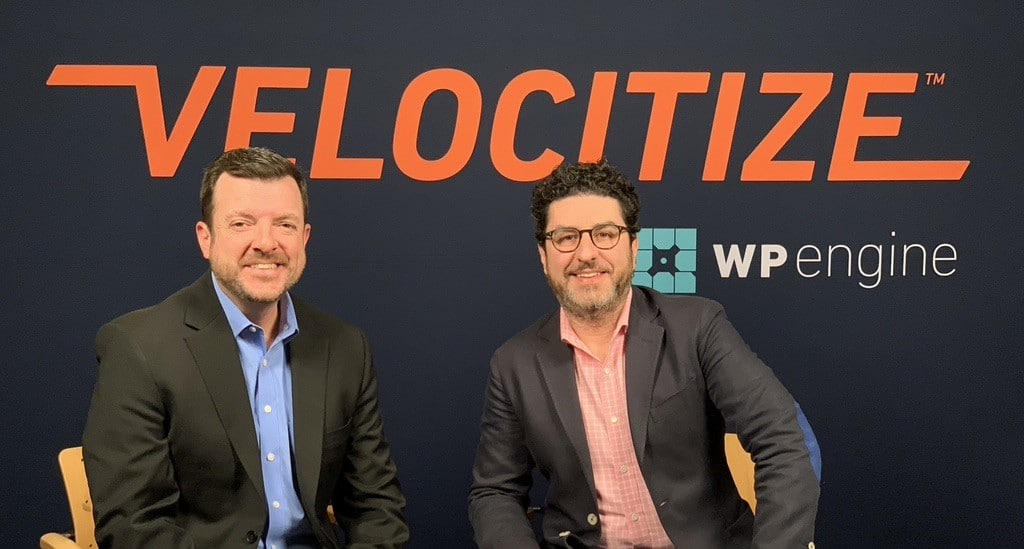We live in a world now in where digital is the whole thing. When people talk about digital marketing, they’re really just talking about marketing.
Ben Ostrower is the Founder and Creative Director of Wide Eye, an award-winning web design and development studio working for purpose-driven organizations from the Democratic Congressional Campaign Committee to the American Cancer Society. Prior to founding Wide Eye, Ostrower was a producer of PBS documentaries.
In this episode of Velocitize Talks, Ben Ostrower shares his story of how digital, purpose-driven marketing has been on the forefront of his work with worldwide social change organizations.
Do good (0:25)
We love working in a space where we’re working with clients who are on the front lines of trying to transform society for the better and to achieve a more just society.
“Changing the world? Let’s work together.” Wide Eye’s slogan encapsulates their mission to work in purpose-driven marketing for organizations, visionaries, and big thinkers. Across their campaigns, they help clients take their ideas from concept to reality by communicating to their audiences boldly.
Ostrower founded Wide Eye in 2009 after being inspired by the 2008 Barack Obama presidential campaign. “It started with a simple and naive premise that good design and smart technology should be accessible to those on the front lines of doing good: campaigns, organizations, charities, and nonprofits,” Ostrower says.
No more silos (2:30)
The notion of digital marketing is so fragmented now because it’s inclusive of everything.
Ostrower says he sees the world as no longer marketing in an analogue way: siloed communication, advertising or marketing channels. “Digital has gobbled up all of these different disciplines that used to be these different departments within a company or organization,” he says. Therefore they can no longer exist alone, as that’s no longer an effective digital marketing strategy.
Additionally, digital marketing is focused on meeting a customer where they spend most of their time: online. The most common digital marketing tactics brands are leveraging include Search Engine Optimization (SEO), content and social media marketing, pay-per-click, native advertising, email, inbound marketing and sponsored content. Subsequently, the best marketers have a clear picture of how to create a campaign that supports their goals.
Her story (7:46)
The simple building blocks of narrative and storytelling are applicable to almost any creative undertaking; the notion of there being a protagonist and an antagonist and a clear arc for where you want to take someone. Whether it’s a single Instagram post or a 30-second video ad, there needs to be a point of view.
Wide Eye created the brand, website, and online store for Kamala Harris’s 2020 presidential campaign, For the People. Throughout the campaign, their digital marketing strategy focused on being accessible to the broadest audience possible. In order to create a captivating story arc, Wide Eye connected the senator’s background and her values with Shirley Chisholm’s historic run in 1972 as the first African American woman presidential candidate in U.S. history.
That connection back to Chisholm’s groundbreaking presidential run was recognized by many media outlets. As a result, it successfully laid the foundation for the distinctive voice, story and brand of the campaign.
On purpose-driven marketing (10:28)
Your audience is looking to have a relationship with brands. In deciding to purchase something or engage with an organization or donate, they feel like they have a personal investment and stake in that organization or company’s mission.
Due to the changing political landscape, people have been seeking out brands that declare their purpose and values. In making their mission known, brands are also strengthening the relationship between themselves and their customers. Nearly eight in 10 Americans say they are more loyal to purpose-driven brands than traditional brands, according to a 2018 study from Cone/Porter Novelli.
Meanwhile from that same study, 68% say they are more willing to share content from purpose-driven brands with their social networks. However, that doesn’t mean just throwing up a black square or Facebook frame to declare support for a cause; customers are also looking at how companies are truly living out their values in all the work they do.
For more information on Wide Eye, check out their website and follow them on Instagram and Twitter at @WideEyeCo. Additionally, to keep up with Ben Ostrower, follow him on LinkedIn.
